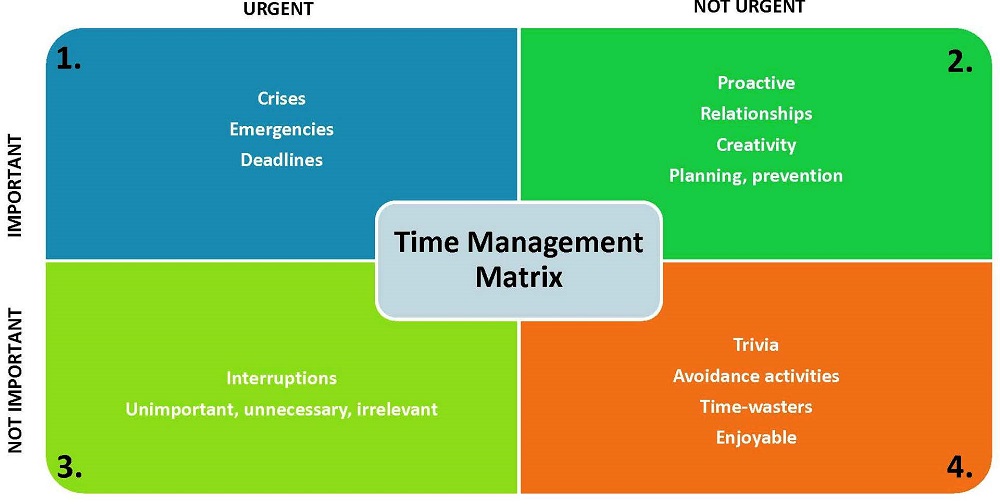
Time is money, and while it's possible to play poker for many different reasons like fun or the need to improve and master, money is the way keep score. Because of that, proper time management is crucial and every poker player should learn effective techniques that can help him or her in the process. Time Management Matrix by Stephen Covey is a great example of such technique.
The Value of (Your) Time
“There are so many ways of killing time, but nobody knows how to bring it back".
Time is the only resource we can't make more of, we can only use the amount we've been assigned. Therefore, it's important to invest it wisely. If philosophical arguments aren't really your cup of tea there's also another tangible reason that makes time management worthwhile - money.
While the "poker player" doesn't seem like a profession where workers are paid by the hour, they are indeed. It's just tricky to calculate the amount of money poker player can expect to earn per hour because it's affected by variance and therefore variable in the short run. Another problem is that we can't ever know what our exact win rate actually is, but we're all guilty of estimating that value. If you're a professional player relying on poker winnings to pay the bills, (or even a semi-pro who plans his vacation based on how well he or she does at the tables), you have to make your best guess.
To calculate hourly win rate, you have to estimate your actual win rate in big blinds per hundred hands, the value of rakeback and promotions, and lastly, you have to know your hourly volume. For example, a semi-pro NL20 cash game player with estimated win rate of 2bb/100 who plays 500 hands per hour while 6-tabling, who gets 30% of the rake back, rakes on average 14$ per thousand hands and will have an hourly win rate of around 4 bucks. 10bb per hour from win rate plus another 2 bucks or so per 500 hands from 30% rakeback. Nothing to write home about, but not bad for a hobby considering low volume and low win rate.
If you bumped that player win rate to 10bb/100, his hourly would be a much more respectable 12$ per hour. If instead, you bumped his rakeback to 50% it would be around 5.5$. In any case, the time of a poker player is valuable and every player should be on the lookout for ways to maximize the amount of time he or she can spend at the table without sacrificing the win rate. That's why time management is a vital part of every poker player's strategy.

Time Management Matrix
Now that we've established that time management is important, let's take a look at one of the easiest and most effective ways of managing it. As for how much time we should be dedicating to playing and learning how to play cards, this will be different for everyone. It depends on your priorities, living arrangements, work and family situation etc. etc.
Rather than focusing on the exact amount, let's use the tool that will help you manage the amount you have. Time Management Matrix developed by Stephen Covey is one of the best tools for the job. The idea of it is fairly simple, you group all the possible activities for a certain time period in four different categories or quadrants (we're talking about a matrix after all) based on their importance and urgency. The four different categories are - Important Urgent, Important Not Urgent, Not Important Urgent and Not Important Not Urgent.
"It's more important to do the right thing than to do things right" - Peter Drucker.
The ones that you assign to the first quadrant are obviously the most important. You should deal with them in the first place and invest most of your time in them. The activities in the second quadrant need to be planned for. They are certainly worthy of your attention and are important to your long-term success, but you deal with them less frequently. At the same time, it's important not to neglect them and therefore planning is crucial. The unimportant but urgent tasks from the third quadrant need to be minimized or eliminated. Same goes for the ones in the fourth quadrant.

Guide to Using The Time Management Matrix in Poker
Now that we know how Stephen Covey's time management matrix works let's try to apply it to poker. The first step would be to list everything you usually do (or wish you were doing) in the time that you spend on poker-related activities. Let's use a hypothetical list that a semi-pro no-limit hold'em cash game player could come up with:
- Poker session.
- Re-designing a HUD.
- Reading poker forums.
- Browsing the internet.
- Session analysis.
- Coaching video.
- Database analysis.
- Learning PLO.
- Learning Badugi.
- Private coaching.
- Study group sweat sessions.
Now let's put those activities in the time matrix categories:
Important Urgent
- Poker session.
- Session analysis.
Important Not Urgent
- Coaching video.
- Database analysis.
- Learning PLO.
- Private coaching.
- Study group sweat sessions.
Not Important Urgent
- Reading poker forums.
Not Important Not Urgent
- Re-designing a HUD.
- Browsing the internet.
- Learning Badugi.
Wrap Up
Like with almost every poker related subject, there's no 'one size fits all' approach. Depending on your situation, preferred game, stakes, skill-level etc. you might assign those activities to different groups (or operate on a very different set of activities), but once you assign them to the specific categories it's important to make changes to your routine.
Based on the example provided above, you'd ideally assign fixed amount of hours each day for poker sessions and session analysis. Then you'd find a place for all of the coaching methods from the second quadrant in your schedule, but you don't necessarily have to do them with the same frequency or intensity. For example, you might want to watch coaching videos once a day or two times per week. If you don't have a lot of money in your budget for private coaching you might want to do it only once per two or three months. You can put a pin in learning PLO for now, but if you think it's viable you should revisit that decision in a few months etc. Your daily habit of reading poker forums from the third quadrant might not be very productive and you should minimize the amount of time spent on doing that, but it's most likely still important enough for you to find a few minutes for it in your routine (keep in mind that this is just an example, discussing hands or poker concepts using PokerVIP forums is certainly a worthy pursuit for most players). Browsing the internet and learning Badugi should probably be ignored.



